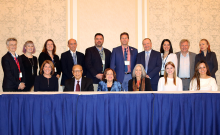Our recommendations
Recommendations
IMMEDIATE
• Maintain and further invest in quality programmes and services for families and their young children that live in situations of conflict, military occupation (Watchlist, 2020) and displacement during the COVID-19 response efforts (Yoshikawa et al., 2020).
• Ensure that essential child protection services are recognised as lifesaving and continue to be provided and made accessible to all children even during lockdowns, quarantines and other types of restrictions.
• Prioritise protection of young children, who in this time of crisis are highly susceptible to neglect, abuse, violence, exploitation, and stigma as their parents/caregivers experience increased instability and stress, which may result in long-term and irreversible negative consequences.
• Use mass media – radio, television and social media – to promote psychosocial support, cognitive development, nutrition and physical activity. Ensure existing online resources are accessible and address pre-existing inequalities in fragile and conflict affected settings. Ensure children’s experiences are safe and positive during the COVID-19 pandemic (UNICEF, 2020).
• Invest in new research to understand the impact of COVID-19 on children and their families:
(i) the adverse impact of the pandemic on parents/caregivers and their ability to provide nurturing care for their children;
(ii) the social-emotional impact of the virus and (the measures to control it) on children;
(iii) the role children play as vectors of the infection; and
(iv) the underlying biology and optimal treatment for the newly identified PMI syndrome that is associated with COVID-19. A more evidence-based understanding of these issues will help governments in their decision making about opening or closing early childhood development (ECD) centres and schools at various stages of the pandemic.
MEDIUM-TERM
• Ensure an inclusive approach for all children and their families living in situations of conflict, military occupation and fragility, including migrants, refugees and internally displaced persons, who have a right to the highest attainable standard of health (OHCHR, 2008). Those children should be entitled to protection for themselves and their families, including having access to testing and early detection for COVID-19, and the means to physically distance, self-isolate and take other appropriate physical and mental health measures (IASC, 2020).
• Uphold the rights of vulnerable children and their families as we emerge from this pandemic into recovery. It is vital to have ECD programmes that are multileveled, benefiting the child and parents/caregivers, the community, and institutions at national, regional and local levels. Programmes should be safe, protective, inclusive, accessible and most importantly, culturally sensitive, to allow children and their families the space they need to be the driving force for social change.
• Protect women’s and girl’s rights, without discrimination, and support community-based action through gender-based analysis to favour their empowerment and social inclusion.
LONG-TERM
• Build on the extensive body of international research on the power of ECD to promote peace and sustainable development.
• Invest in strengthening systems (e.g. through financial resources, capacity building, personnel training) with a holistic and whole-of-government (multi-ministry) approach.
Topics & initiatives
|
|
JOIN THE CONVERSATION
For breaking news and to stay connected, follow us on social media. Sign up to get our E-News delivered straight to your inbox.



